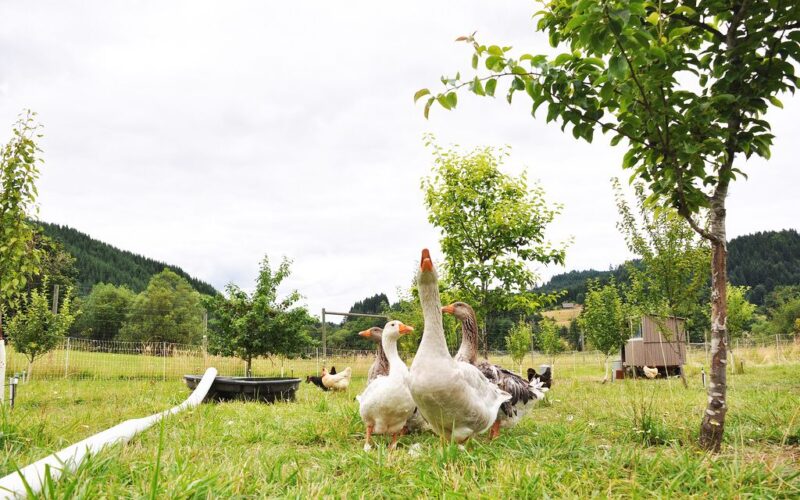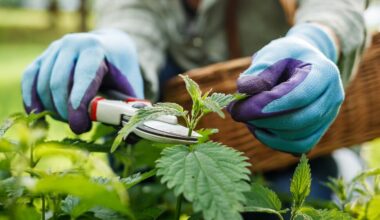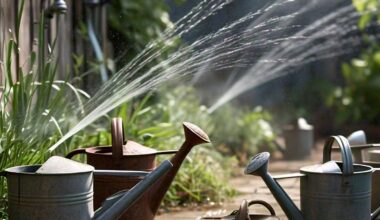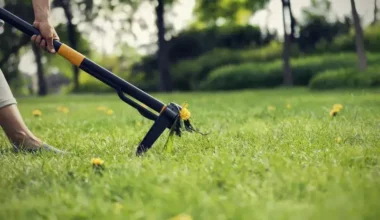Imagine a natural way of fighting weeds on your farm. Stop using harmful herbicides and save money. Introducing weeder geese – the unsung heroes of sustainable weed management.
Weeder geese have been used in Asia and the U.S. for years. They help control weeds in many crops like cotton, berries, potatoes, and orchards. These birds love to eat grasses, making them great for crops with specific weed issues.
Using these birds means you can cut down on expensive and dangerous substances. You’ll also get many other benefits.
So, why are weeder geese so good, and how can they change your farm’s weed management? Find out in the next sections as we dive into the amazing skills of these birds.
The Benefits of Using Weeder Geese
Eliminate Herbicides with the Geese Weeder
Weeder geese are great at getting rid of weeds without using pesticides. This substance can be costly and bad for the environment and people’s health. As we worry more about these issues, we’re looking for safe, green ways to manage unwanted plants. Using weeder geese is one such solution.
Weeding with goose can be quick and can get to weed close to crops easily. They can’t be reached by machines or by hand. This means they can clear grass without hurting the crops. Plus, their poop is full of nitrogen, which helps the soil and plants grow better.
- Spring Rain Farm & Orchard uses over 75 weeder geese to help with farming. They’ve been doing this for four years.
- The geese cover 26 acres of land. They eat grass and weeds in the pastures and around berry bushes, apple, and pear trees.
- In January and February, the geese will eat grain. But they mostly eat from the land all year.
- They are key in controlling weeds around blueberry bushes in the winter and early spring.
Adding weeder geese to your farm means you don’t need harmful herbicides. You get to use their natural weed control and their manure’s nutrients. This makes weeder geese a green and smart choice for fighting weeds and managing them naturally.
Why Weeder Geese are Effective
Using geese for weeds are a great choice for naturally controlling weeds on farms. Geese are more active, eat weeds naturally and prefer certain plants over others. This makes them very good at getting rid of unwanted plants.
They love to eat grasses and don’t like many broad-leaved plants. This means they can help with specific weed problems in your crops. They will eat weeds like young Bermuda grass and many others.
One farmer with a big farm even taught his geese to eat weeds they didn’t like before. He fed the weeds to the baby geese. This helped the geese learn to eat those weeds.
Weeder geese do more than just eat weeds. They also eat fruit that falls from trees and some crops that are left over. This helps keep your farm healthy by stopping weeds and pests from spreading.
Weeder geese have big appetites and can adapt to find different types of food. They are a natural way to manage weeds on your farm. They help with specific weed problems and keep pests away, making them a great choice for organic farming.
What are Weeder Ducks
Geese are the main birds used for unwanted plant control, but some farms also use ducks. These birds eat insects, and snails along with the geese. They work together to keep the farm pest-free.
Ducks are great at eating snails, bugs, and weeds. Indian Runner ducks are a good choice because they forage well and lay many eggs. Adding ducks to the geese can make pest control more effective on your farm or in your garden.
Weeder geese mainly control weeds, but ducks add extra benefits. Ducks eat insects, slugs, and some weeds, helping the geese. This mix reduces the need for harmful chemicals, making farming more sustainable.
Using both weeder geese and ducks creates a strong pest control plan. It cuts down on harmful chemicals and helps your land stay healthy. This method supports a diverse ecosystem.
To make the most of weeder ducks, know their habits and what they like to eat. Training them to focus on slugs, insects, or certain weeds is key. With the right care, ducks can be a big help in managing pests and weeds.
Training Weeder Geese
Weeder geese can be a great help in fighting weeds on your farm. But they need the right training to work well. Start training them early because goslings learn fast and can pick up on certain weeds early.
Developing a Taste for Specific Weeds
It’s important to show the geese the weeds you want them to eat. By the time they are two days old, they start to eat, and their parents teach them what to forage. Show them the weeds you want them to eat to make them prefer those crops.
Training adult geese takes more work but is still doable. Use electric poultry fencing to keep them in the right areas. Give them treats there, and they’ll learn to go there for food. Soon, they’ll eat mainly in the spots you want them to.
- Start training goslings as early as two days old to develop their weed foraging habits
- Introduce the specific weeds you want them to target, allowing them to develop a preference
- Use electric poultry fencing to confine adult geese to desired grazing areas and provide treats to reinforce the association
- Be consistent and patient in your training approach for the best results
Training your weeder geese well lets you use their natural eating habits to avoid harmful herbicides. With patience, your geese will help keep your farm weed-free.
Preferred Weeds for Weeder Geese
Weeder geese are great at eating weeds in open areas. They love to eat grasses, broadleaf weeds, and some invasive plants. They prefer weeds like dandelions, chickweed, clover, and crabgrass. They also eat young Bermuda grass, Johnson grass, sedge, nut grass, puncture vine, horsetail, and many other unwanted plants.
A grower with over 100 acres of herbs has trained his geese to eat weeds they wouldn’t normally touch. He feeds the weeds to the young goslings, making them like these plants. This way, the geese can eat a wider variety of weeds on the farm.
Weeder geese eat a lot of weeds but have some favorites and things they avoid. They don’t like toxic plants like ragwort, buttercup, and hemlock. They also don’t eat mature foxtail grasses.
Weeder geese are very useful for controlling weeds on farms. By knowing what they like to eat and training them, farmers can use these birds to make their land healthier and more productive.
Breeds of Weeder Geese
Geese are great at eating weeds, making them perfect for weeding. Some breeds are more popular for this job than others.
The Chinese breed is a top pick. They are light, so they won’t hurt your crops. On small farms, Emden, American Buff, and Toulouse/Dewlap geese are great at eating weeds.
Choosing the right geese means teaching them to like the weeds you want gone. This makes them very good at controlling weeds.
Top Breeds for Weeding
- White Chinese – These geese are light and can move easily between plants without hurting them.
- Tufted Buff – They are tough and great at finding and eating weeds.
- American Buff – These geese love to eat weeds, making them a good choice for weeding.
It’s important to teach geese to eat the weeds you don’t want early on. This helps them learn to prefer those weeds, making them very good at weeding your land.
Conclusion
Geese are a great choice for weed management on farms and in gardens. They use their natural instincts to eat grass, reducing the need for harmful substances and manual weeding. With the right training, weeder geese can control weeds well and improve soil health, protect crops, and provide meat and feathers.
For both small and large farms, the use of geese can change how you manage weeds. These birds help with sustainable weed control and make your farm or garden healthier and more productive.
Learning about weeder ducks and geese opens up new ways to control weeds naturally. If you want to use fewer duck pest control methods or add weed eating ducks to your farm or garden, these birds are a great choice. For more on the other ways of weed control





